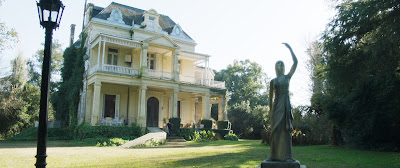That Campanella does decent justice by and to all of these genres and themes makes it easy to simply sit back and relish the fun. The Weasels' Tale may not be a great film, but it certainly is grand entertainment.
The filmmakers put us immediately into the home of some elderly, retired folk from the Argentine movie industry: one of those rare Oscar-winning Best Actresses in a foreign-language film (Graciela Borges, above and below); her has-been, barely-was actor husband (Luis Brandoni, below, right), along with the film director (Oscar Martínez, below, second from left) and screenwriter (Marcos Mundstock, center, right) both of whom were responsible for many of the actress' hit movies back in the day.
From the first lengthy scene we learn that this quartet has been living in a kind of love/hate relationship in which the three men bond against the grand dame, and everyone is relatively miserable-yet-content. "Look at how happy we are,"gloats the self-satisfied film director, and the other men agree. "There are no villains in this piece." Just then, of course, a car pulls into the driveway of their home and out step an attractive young man (Nicolás Francella, above, second from right, and below, left) and woman (Clara Lago, above, left) who've seemingly gotten lost in the countryside but immediately recognize the old actress and prove to be among her most ardent fans. Yes, we're off to the races.
How Campanella wittily and charmingly compares movies to life and Argentina's greedy present to her dictatorial past, together with how these six fine actors brings their very interesting, even complex characters to life, makes The Weasels' Tale a consistent delight. Events grow darker, betrayals abound, and were it not for the terrifically stable tone of humor the filmmakers sustain throughout, things might tumble off track.
They never do. The movie proves consistently amusing, even pertinent. (TrustMovies would not be surprised if this became the highest-grossing foreign-language film for the coming year.) And our heroine -- the real one -- even gets that death scene that's so far eluded her over a long career.
From Outsider Pictures, the film begins its theatrical and virtual cinema premiere this coming Friday, December 11 at over two dozen theaters across the USA and Canada. Click here for more information and to view the theaters at which, or virtually, the movie will screen.

























































